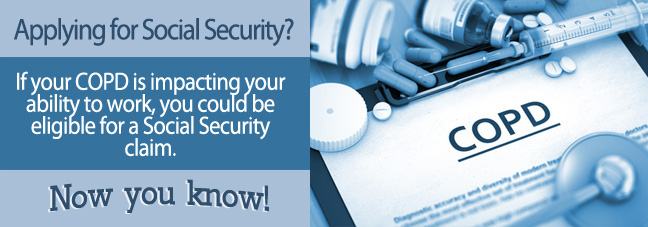What is Chronic Obstructive Pulmonary Disease (COPD)?
Chronic Obstructive Pulmonary Disease (COPD) is a chronic breathing condition caused by a combination of emphysema and chronic bronchitis. The vast majority of Chronic Obstructive Pulmonary Disease (COPD) is caused by smoking tobacco, though excessive dust and other pollutants may cause the condition as well.
Unfortunately, the damage caused to the airway as a result of Chronic Obstructive Pulmonary Disease (COPD) is not generally repairable, and doesn’t typically respond positively to treatment.
It is extremely important that those who suffer from Chronic Obstructive Pulmonary Disease (COPD) stop smoking. While the damage already done cannot generally be fixed, you can prevent further damage.
Further, failure to follow your doctor’s orders to stop smoking can negatively impact your Social Security Disability claim.
Symptoms of Chronic Obstructive Pulmonary Disease (COPD) include chronic coughing, wheezing, shortness of breath, and chest pain. Often these symptoms are triggered or worsened by physical exertion or stress.
When chronic obstructive pulmonary disease is severe enough, it can impact your ability to perform meaningful work or maintain gainful employment.
Is COPD a Disability?
The SSA does consider COPD to be a disability. If you have COPD and you can no longer work full time because of your condition, you may be able to qualify for Social Security disability benefits if you meet the medical criteria outlined by the SSA.
The SSA has what is called the Blue Book, which is the list of disabling conditions that qualify someone for Social Security disability benefits.

COPD is listed in Section 3.02 of the Blue Book under “Chronic respiratory disorders”. If your symptoms match the criteria outlined by the SSA, then the SSA will deem you as disabled and you can qualify for Social Security disability benefits.
In order to qualify for benefits, you must meet one of the following requirements:
COPD, due to any cause, with a forced expiratory volume one (FEV1) that is equal to or lower to the minimum for your height, between 1.05 for those who are five feet and 1.65 or those who are six feet.
Chronic impairment of gas exchange due to documented COPD, with a gas diffusion capacity (DLCO) of a single breath under 10.5 mil/min/mm Hg or a low amount of oxygen dissolved in the blood either during rest or exercise, as determined a low partial pressure of oxygen (PO2) and high partial pressure of carbon dioxide (PCO2).
COPD and Social Security Disability Benefits
If you are considering making a Social Security Disability claim based on your Chronic Obstructive Pulmonary Disease (COPD), your first move should be to make sure you are getting regular treatment by a physician and that you are following all of their suggestions (including throwing your cigarettes away). You should review the Blue Book with your doctor to see if you meet the medical qualifications.
Most Social Security Disability claims are denied, often because the information the SSA uses to determine whether you qualify for Social Security Disability benefits is not stated correctly on the claims forms.
Unless your doctor has significant experience with disability cases, or is being coached by a Social Security Disability representative, chances are his reports aren’t going to effectively help you receive Social Security Disability benefits.

Working with COPD
Can you work with COPD? Yes, you can but having COPD can make doing your normal work routines much harder than it was before your diagnosis.
You may be able to do only some of your normal job functions with your COPD and you may still be fit to work with COPD.
However if your COPD progresses and gets worse, you may not be able to work full time because of it anymore.
If that is the case, then you may be able to qualify for Social Security disability benefits with COPD. According to the Centers for Disease Control and Prevention (CDC), out of an estimated 15.7 million adults had been told by health professionals that they have COPD, 24.3% of them were more likely to report being unable to work.
If you have COPD and you still think you may be able to work, you may want to talk with a supervisor or boss on what reduced or different job duties you can do due to your condition.
If you work a blue collar job, such as a construction worker and you inhale particles from dust to plaster, your COPD might make it impossible for you to work full time. If that is the case, then you may want to apply for disability benefits.
Chronic Obstructive Pulmonary Disease (COPD) and Your Ability to Perform Physical Work
Chronic Obstructive Pulmonary Disease (COPD) can make it impossible for you to continue performing physical work. Because the condition is often triggered by physical exertion, many who suffer from it find that they can no longer continue working at the jobs they have worked at in the past.
The Social Security Administration will look at all of the jobs you have held in the past 15 years to see if you are physically capable of performing any of them.
Ultimately, it is up to you (and your Social Security Disability attorney, if you have one) to prove that you are no longer capable of performing in any job which you are qualified for.
Chronic Obstructive Pulmonary Disease (COPD) and Your Ability to Perform Sedentary Work
It is sometimes more of an uphill battle to prove that you are incapable of performing sedentary work.
To perform most sedentary work, all you need to be able to do is sit for six hours or longer. Unskilled sedentary work often requires use of fine motor skills. Chronic Obstructive Pulmonary Disease (COPD) doesn’t directly affect any of these skills.

However, if your Chronic Obstructive Pulmonary Disease (COPD) is severe enough, or if it has been shown to be triggered by the kind of stress that often accompanies office work, you may still qualify for Social Security Disability benefits.
If you are older than 55 and have never performed sedentary work, the Social Security Administration may approve your application regardless of the fact that you are physically capable of performing sedentary work.
Qualifying If You Cannot Work But Don’t Meet A Listing
You could be disabled but your condition may not meet the specific criteria of the listing. Just because you cannot meet the listing doesn’t mean that you cannot still have your disability claim approved. Many claims are approved using a medical vocational allowance. This approach takes multiple things into consideration to determine if you are capable of working and earning a living.
While all your medical issues are considered along with your symptoms, treatments, and side effects, Disability Determination Services (DDS) will also consider your age, your work history, any transferable skills, your educational background, and so forth.
After reviewing all those details, they will be able to determine what kind of work – if there is any kind of work – that you can do.
An important aspect of a medical vocational allowance is the residual functional capacity (RFC). The RFC is a form that DDS will complete based on the information and medical records that they are provided for review.
If you can get your physician or different physicians to complete RFCs, it can be very beneficial to your claim. Your physicians know more about what you can and cannot do than anyone else, so an RFC filled out by your doctor will play a major role in the outcome of your disability claim for COPD.
What Does An RFC Do?
The RFC is very detailed, painting the full picture of how you are affected by COPD. DDS can see how your daily activities are affected as well as your work abilities. As an example, the RFC may indicate that you cannot walk more than 300 feet before experiencing shortness of breath, or it may indicate that you cannot stand more than an hour without having to sit or reposition.
Because of your COPD, your RFC may indicate that you cannot work around inhalants, dust, dirt, sawdust, or similar problems that would make breathing even more difficult. Because of lowered oxygen levels causing dizziness and confusion, you may not be able to work around machinery or operate heavy equipment. You may need frequent rest breaks, and you may need to sit often.
This RFC should paint a clear picture of how your life has been affected by COPD. The disability examiner will then consider your age, work history, and educational background to determine what kind of work you can do. Or if you are able to work at all.
The older you are, the fewer jobs you have done, and if you have a limited educational background, the more likely you are to be approved for benefits because you are less likely to be able to work.
Using The Blue Book To Show You Can’t Work
The Blue Book can help you with your disability claim. The Blue Book is the medical guide used by the SSA to determine if a claimant qualifies for disability benefits. The Blue Book has sections for different body systems and the different sections have listings for different medical issues related to that system that could be disabling.
To be approved for disability benefits with COPD, you must have medical records that confirm the diagnosis of the condition. You must have undergone tests that confirm you have very limited airflow. You will need to provide medical records with results from one of the following accepted tests:
- An ABG test that measures the partial pressure of oxygen and carbon dioxide in the blood
- A DLCO test that measures how much oxygen passes into your blood
- A spirometry test that documents your forced expiratory volume in a second, which is the amount of air you can exhale within a second
- An oxygen saturation test
There are several different tables regarding chronic pulmonary insufficiency. These tables have sections based on age, height, and gender that state the lung functioning value for those different kinds of tests and what test results qualify for disability benefits.
As an example, a man who is younger than 20, 6-foot-tall, and has an FEV1 of 2.10 or less, he would qualify for disability benefits.
That test results shows that you have such difficulty breathing that your oxygen level is negatively affected. That will keep you from being able to perform routine daily tasks let alone work and earn a living.
When you meet those specific criteria, and provide the supporting evidence, you can be approved for disability benefits and start receiving monthly payments from the SSA.
Documentation
Hard medical evidence and supporting documentation is essential to the success of your disability claim. Provide medical records from all your healthcare providers. You will need to provide physician notes, surgical notes, test results, treatment records, and so forth. The more supporting evidence that you can provide, the more likely you are to have a successful disability claim.
You will need to gather records about your work history that includes job titles and work responsibilities.
You need to make sure your file is complete so that it can be properly reviewed and then your claim can be considered fairly, and if you qualify for disability benefits, you can have your claim approved and be awarded monthly benefits.

A disability lawyer will help you get your claim prepared and will ensure that all your supporting evidence and documentation is in the file for review. Just one missing document could cause your claim to be denied.
You can retain a lawyer at any time during the claims process, but if you talk with a lawyer before your claim is filed it can help you get your documentation in order early on so you can show that you are disabled.
When you retain a disability attorney, you will not have to pay anything out of pocket or upfront. Disability attorneys take cases on a contingency basis, which means that your lawyer will not be compensated until your claim is approved and you are awarded backpay.
Talk to a Social Security Attorney Today
If your COPD is impacting your ability to perform your day-to-day tasks at work, it might be in your best interests to contact a Social Security attorney as soon as possible.
They can help you gather all the necessary medical documentation and information you need in order to give you the best chance of winning your case.
You can get your claims process started online on the SSA’s website. If your initial application is denied, you can still get disability with COPD.
You can work with a Social Security lawyer who can help you get your paperwork and medical records in order to file an appeal to your initial application.
Once you get approved disability for COPD, you can spend your benefits on medical treatment related to your condition, prescriptions you are taking and basic day to day needs.
Even if your claim has already been denied, you have a right to appeal the decision. You also have the right to representation by a qualified Social Security Disability attorney at all steps of the appeals process.